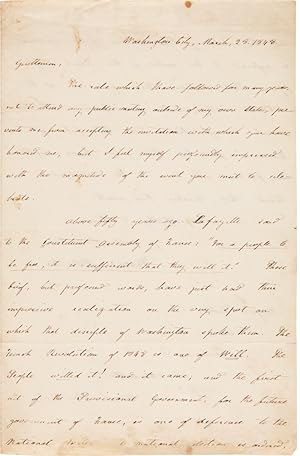[AUTOGRAPH LETTER, SIGNED, FROM THOMAS HART BENTON, DISCUSSING THE FRENCH REVOLUTION OF 1848]
Benton, Thomas Hart
From
William Reese Company - Americana, New Haven, CT, U.S.A.
Seller rating 3 out of 5 stars
![]()
AbeBooks Seller since July 13, 2006
About this Item
Description:
[2]pp. plus integral blank. Folio. Old fold lines. Lightly soiled. About very good. In a tan cloth folder, gilt leather label. Senator Thomas Hart Benton writes to "Messrs. Stubbs, Ennis, Sheaham, &c., a committee, &c.," discussing the French Revolution of 1848, in which he mentions the Marquis de Lafayette's desire for democracy for the French people. The Revolution of 1848 saw an end to the French monarchy and the beginnings of the Second Republic. The Republic, however, lacked strong organization and leadership, and in 1851, President Louis Napoleon disbanded the elected assembly and declared himself Napoleon III. The second French empire would last until 1871, when the Third Republic was established, which lasted until World War II. In 1848, however, feelings were high and positive, as shown in this letter by Benton. He writes: "Above fifty years ago Lafayette said to the Constituent Assembly of France: 'For a people to be free, it is sufficient that they will it.' These brief, but profound words, have just had their impressive realization on the very spot on which that disciple of Washington spoke them. The French Revolution of 1848 is one of Will. The People willed it! and it came! and the first act of the Provisional Government, for the future government of France, is one of deference to the national Will. A national election is ordered, and the whole question of their future government is referred to the votes of the French people. If, in that election, the expression of the national Will shall correspond with its present manifestation, then the fate of France is fixed by those who have a right to fix it, and wo[e] to the sacrilegious hand that touches this work." Thomas Hart Benton (1782-1858) was a Missouri Senator and statesman who served in the U.S. Senate for thirty years, during the crucial years leading up to the Civil War (1821-1851). Prior to his service in the Senate he fought in the War of 1812 and fought several duels, including one sword and pistol brawl with Andrew Jackson, though he later became a Jackson supporter and a staunch Democrat. He broke with his party, however, over slavery and secession, staunchly arguing for preservation of the Union. Seller Inventory # WRCAM42994
Bibliographic Details
Title: [AUTOGRAPH LETTER, SIGNED, FROM THOMAS HART ...
Publisher: Washington
Publication Date: 1848
Top Search Results from the AbeBooks Marketplace
[AUTOGRAPH LETTER, SIGNED, FROM THOMAS HART BENTON, DISCUSSING THE FRENCH REVOLUTION OF 1848].
Seller: William Reese Company - Americana, New Haven, CT, U.S.A.
[2]pp. plus integral blank. Folio. Old fold lines. Lightly soiled. About very good. In a tan cloth folder, gilt leather label. Senator Thomas Hart Benton writes to "Messrs. Stubbs, Ennis, Sheaham, &c., a committee, &c.," discussing the French Revolution of 1848, in which he mentions the Marquis de Lafayette's desire for democracy for the French people. The Revolution of 1848 saw an end to the French monarchy and the beginnings of the Second Republic. The Republic, however, lacked strong organization and leadership, and in 1851, President Louis Napoleon disbanded the elected assembly and declared himself Napoleon III. The second French empire would last until 1871, when the Third Republic was established, which lasted until World War II. In 1848, however, feelings were high and positive, as shown in this letter by Benton. He writes: "Above fifty years ago Lafayette said to the Constituent Assembly of France: 'For a people to be free, it is sufficient that they will it.' These brief, but profound words, have just had their impressive realization on the very spot on which that disciple of Washington spoke them. The French Revolution of 1848 is one of Will. The People willed it! and it came! and the first act of the Provisional Government, for the future government of France, is one of deference to the national Will. A national election is ordered, and the whole question of their future government is referred to the votes of the French people. If, in that election, the expression of the national Will shall correspond with its present manifestation, then the fate of France is fixed by those who have a right to fix it, and wo[e] to the sacrilegious hand that touches this work." Thomas Hart Benton (1782-1858) was a Missouri Senator and statesman who served in the U.S. Senate for thirty years, during the crucial years leading up to the Civil War (1821-1851). Prior to his service in the Senate he fought in the War of 1812 and fought several duels, including one sword and pistol brawl with Andrew Jackson, though he later became a Jackson supporter and a staunch Democrat. He broke with his party, however, over slavery and secession, staunchly arguing for preservation of the Union. Seller Inventory # 42994
Quantity: 1 available


